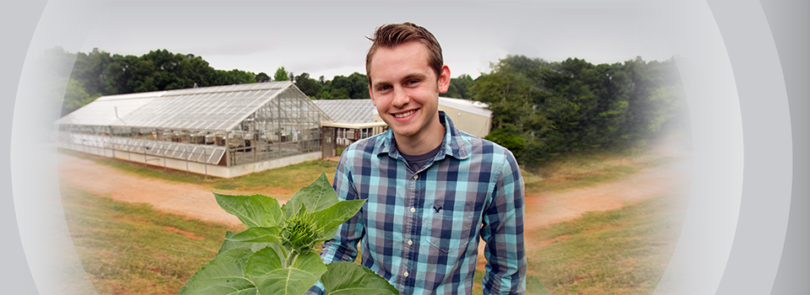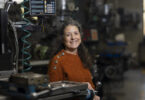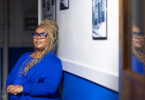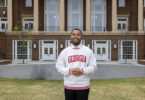Chase Mason, a Ph.D. student in plant biology, enjoys spending most of his time in the lab or greenhouses, and he says UGA has provided the support he needs to fulfill his academic goals.
Hometown:
Palatka, Fla.
High School:
Palatka High School
Degree objective:
Ph.D. in plant biology
Other degrees:
B.S. in zoology, minor in botany, University of Florida, 2009
Expected graduation:
Spring 2015
University highlights, achievements, awards and scholarships:
Probably the best title for me would be “plant evolutionary ecophysiologist,” which is a mouthful but just means I work at the intersection of evolution, ecology and plant physiology. More specifically, I research how plants adapt to different environments, using several dozen species of wild sunflowers as a model system.
Since arriving at UGA in 2009, I’ve received the Rosemary Grant Student Research Award from the Society for the Study of Evolution, an NSF Graduate Research Fellowship Honorable Mention and a UGA Graduate School assistantship. I have been fortunate enough to receive a variety of funding for my research, including the Rosemary Grant Award, several plant biology departmental research grants and two UGA Graduate School Summer Innovative and Interdisciplinary Research Grants in 2012 and 2013.
Family Ties to UGA:
I’m the first person in my family to attend UGA.
I chose to attend UGA because…
We have one of the top plant biology programs in the nation, and it’s one of the most cooperative, collaborative and downright friendly departments I’ve had the pleasure to know. We’re also highly diverse intellectually, with research interests spanning from molecules to continents. It was for these reasons, and to work with my awesome adviser Lisa Donovan, that I chose to come to UGA.
My favorite things to do on campus are…
The places you’ll usually find me on campus are in the lab or at the greenhouses, working on experiments and analyses. We’re quite lucky to have such superb greenhouse facilities and staff, and it’s a simply lovely place to be. If I’m not at one of those two places, I’m teaching Introductory Plant Biology labs with Brigitte Bruns. I’m quite fond of teaching nonmajors about plant ecology and evolution, and Dr. Bruns is a fantastic facilitator of our departmental introductory labs. In terms of my favorite places on campus, the State Botanical Garden of Georgia is a marvelous place in any season, and I always make a point to showcase it to visiting friends and family.
When I have free time, I like…
What is this “free-thyme” of which you speak? Ha! Anyone who knows me will tell you I’m absolutely bored when not doing science for more than a few hours. I take on more projects, collaborations and undergraduate researchers than is probably healthy, but it’s what I enjoy more than anything. When I do take a few hours off, I spend most of my down time with my better half, Eric Goolsby, who’s a Ph.D. student in toxicology and also my principal research collaborator. However, we invariably grow restless and return to science—it’s actually quite funny.
The craziest thing I’ve done is…
On a trip to Alaska in May 2011, my mom and I were hiking on one of the trails on Mount Roberts, near Juneau, and I was totally getting caught up looking at the expansive carpets of mosses and lichens and mushrooms and alpine wildflowers in the understory of the temperate rainforest, a biome I had not previously had the chance to see. There were still large patches of snow obscuring the trail, and we temporarily lost the main path. After regaining it, we continued up past the main tree line, where the snow got much deeper and the trail a bit difficult to follow. We eventually got to a steep section of trail that got a bit too slippery for comfort, and we decided to turn back. Following the trail backward we found the section of trail we had previously missed, and there we noticed the very large sign reading “AVALANCHE CONDITIONS EXIST!” and detailing how the spring melt season renders the snow pack extremely unstable and dangerous, and how the melting snow pack can hide streams, waterfalls, logs, deep holes in the snow and cliffs. Needless to say we were more than a bit unnerved by the experience, but we got some great pictures!
My favorite professor is…
I’ve had the immense pleasure to know so many great professors here at UGA, from both my home department and the other life science departments. However, my adviser, Lisa Donovan, was one of the main reasons I chose to come to UGA. One could not ask for a more engaged and helpful adviser, one who strongly fosters independence and encourages collaborative projects. I owe a huge part of my success to her.
If I could share an afternoon with anyone, I would love to share it with…
People always seem to answer this question by wanting to talk to a famous long-dead person, but we already know tons about those people. I’d want to talk to someone from the future—perhaps the year 2500? We could learn a lot more about ourselves, our planet and, indeed, the universe from an afternoon with a scientist or historian from 2500 than anyone from the past. Of course, that would undoubtedly change the future … well, depending on which time-travel canon you subscribe to.
If money was not a consideration, I would love to…
Goodness, I think I’d probably found a research institution, something in the style of the old Carnegie system that funded promising individual researchers over long periods rather than funding specific short-term research projects. I’m more than a bit nervous about the decline of governmental prioritization of basic science research, with more and more emphasis on applied short-term research with obvious results. Some of our greatest discoveries and breakthroughs have come about as accidents and byproducts of long-term research in unexpected topics. Not to be too grandiose, but working to change the chronic shortsightedness of our political and economic systems is an imperative to ensuring the survival and progress of our species. Our current systems are simply not conducive to solving problems that arise over the course of centuries. Along the same lines, one of the keys to changing this is improving the dreadful public understanding of science and reason. I would contribute substantially to the work of the National Center for Science Education and the Center for Applied Rationality, and I encourage anyone who isn’t familiar with these two organizations to check them out.
After graduation, I plan to…
I plan to vigorously pursue a research career in evolutionary biology.







